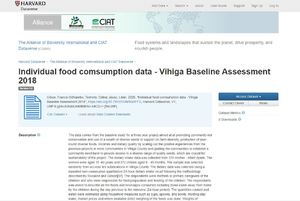Individual food comsumption data - Vihiga Baseline Assessment 2018
The data comes from the baseline study for a three year project aimed at at promoting community-led conservation and use of a wealth of diverse seeds to support on-farm diversity, production of year-round diverse foods, incomes and dietary quality by scaling out the positive experiences from the previous projects in more communities in Vihiga County and guiding the communities to establish a community seed bank to provide access to a diverse range of quality seeds, which are crucial for sustainability of the project. The dietary intake data was collected from 370 mother - infant dyads. The women were aged 15 -60 years and 372 childen aged 6 - 49 months. The sample was selected randomly from accross ten sublocations in Vihiga County. The dietary data was collected using a repeated non-consecutive quantitative 24-hour dietary intake recall following the methodology described by Rosalind and Gibson[37]. The respondents were mothers or primary caregivers of the children and who were responsible for food preparation and feeding of the children. The respondents was asked to describe all the foods and beverages consumed including those eaten away from home by the children during the day previous to the interview (24-hour period). The quantities cooked and eaten were estimated using household measures such as cups, spoons, and bowls; molding clay, water, market prices and where available direct weighing of the foods was done. Weights of ingredients consumed were estimated in raw forms and expressed as proportion of the total weights of food prepared. For foods consumed or prepared outside the home, standard recipes were used. The amounts recipe components and of foods and ingredients consumed were converted into nutrients using the Lucille software based on the Kenyan Food Composition Table 2018.

